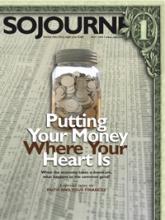Theologian Ched Myers characterizes “Sabbath economics” as the basic struggle of mammon vs. manna. “Mammon” is the Greek word (from Aramaic) used in Luke 16:13 when Jesus notes that “no slave can serve two masters ... you cannot serve God and mammon.” The word is translated “wealth” in the NRSV, and is portrayed a few verses later as the “love of money” (Luke 16:14). Mammon is then illustrated by a tale Jesus tells in Luke 16:19-31, in which a rich man feasts sumptuously and stores up luxury goods even as a poor beggar lies right outside his door. The economy of mammon is one of excess accumulation for some and poverty and deprivation for others.
“Manna,” on the other hand, refers to the story from Exodus 16 in which God rains down “bread from heaven” (Exodus 16:4). The Hebrew people were instructed to gather neither too much nor too little of the manna, but rather enough to meet their needs. And they were not to gather manna on the Sabbath day itself, making this manna story one of the first illustrations in all scripture of the meaning of Sabbath. In contrast to mammon economics of excess and deprivation, this model of manna or “Sabbath” economics stresses God’s abundance and provision. That abundance carries with it the accompanying instruction not to gather too much lest others go without.
Read the Full Article

